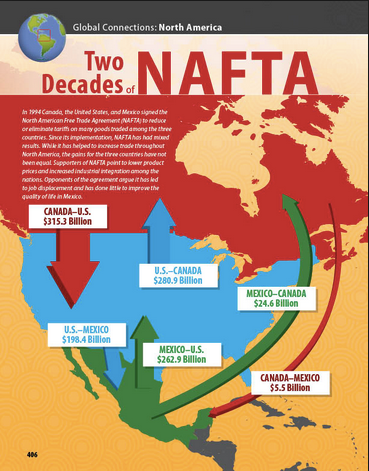“It is my privilege to bring NAFTA up-to-date through renegotiation,” Mr. Trump said in a statement issued by the White House at 10:33 p.m. “I believe that the end result will make all three countries stronger and better.”
The announcement appeared to be an example of Mr. Trump’s deal-making in real time. It followed a day in which officials signaled that he was laying the groundwork to pull out of Nafta — a move intended to increase pressure on Congress to authorize new negotiations, and on Canada and Mexico to accede to American demands.
It was not clear whether the president would still sign an executive action to authorize renegotiation of Nafta, which he once called the worst trade deal ever signed by the United States. Washington must give Canada and Mexico six months’ notice before exiting the trade agreement, which came into force in 1994. Any action to that effect would start the clock.
But the prospect of the United States’ pulling out obviously alarmed the Canadian and Mexican leaders and prompted their calls to the White House.
. . .
Walking away from Nafta would disrupt the economies of the United States, Canada and Mexico, and strain broader relations among the countries. Over the last two decades, their economies have become increasingly intertwined. The volume of trade has multiplied, and the manufacture of many goods, notably cars, involves multiple border crossings and factories in all three nations.
If the United States actually pulled out, experts said, trade with Canada would probably still be subject to a similar agreement between the two countries that took effect in the late 1980s and served as a model for Nafta. The Trump administration, however, could seek to withdraw from that agreement as well.
The shift in the rules governing trade with Mexico would be more significant. The two countries both take part in the World Trade Organization, but that allows much higher tariffs. Mexico, for instance, could impose a 37 percent tariff on American corn. The disruptions to manufacturing could also come at a hefty cost to consumers: Caroline Freund, a fellow at the Peterson Institute for International Economics, has estimated that the cost of a pickup truck might increase by $3,000.
Revisiting Nafta: The Stakes for Key Industries
President Trump may not be terminating the North American Free Trade Agreement, known as Nafta, but that doesn’t mean the deal is safe.
After telephone calls with President Enrique Peña Nieto of Mexico and Prime Minister Justin Trudeau of Canada on Wednesday, Mr. Trump said he would start the process of renegotiating Nafta, a treaty that he had scorned during his presidential campaign, calling it “the single worst trade deal” ever signed by the United States.
Whatever his criticisms, Nafta has had a major impact on the American economy in the decades since it was signed, and any renegotiation would affect certain industries.
Here are four potentially vulnerable sectors: Automobiles, Apparel, Agriculture, Medical Devices
Trump’s Day of Hardball And Confusion on NAFTA
White House officials quickly portrayed the confusion as a vindication of Mr. Trump’s management style and said he had succeeded in bringing Mexico and Canada to the negotiating table — casting it as a signal accomplishment for a president hungry for victories. But Democrats just as swiftly dismissed the events as another example of what they call Mr. Trump’s feral and feckless government by improvisation. They also noted that Mexico and Canada have long been sitting at the table, waiting for the United States.
The messy 24 hours were part of a week in which the West Wing has erupted with an all-guns-firing-at-once frenzy intended to prove that Mr. Trump is an effective leader on the cusp of his 100th day in office. His staff has been alarmed by a trend: A decreasing percentage of Americans, even supporters of Mr. Trump, view him as capable of executing on his muscular if vague campaign promises.




